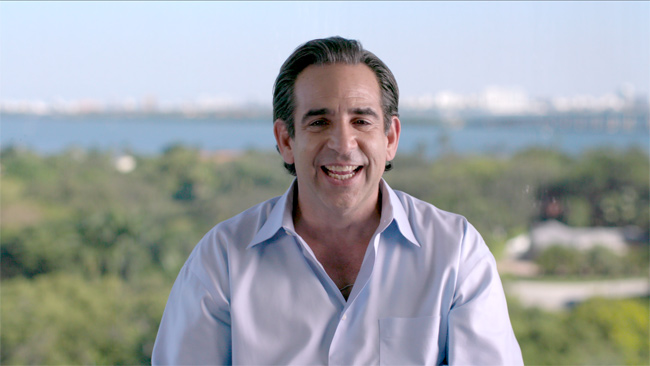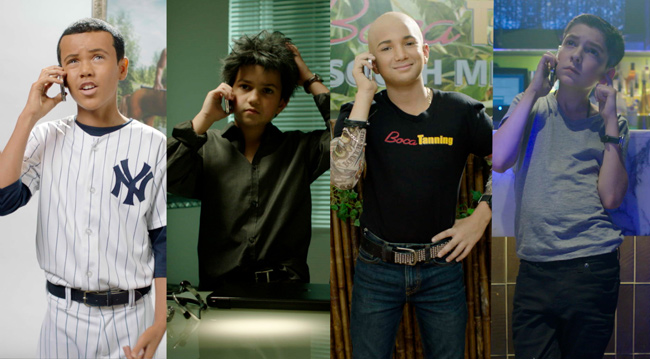
When I got Billy Corben on the phone this week, I asked how he was doing by way of opening pleasantry. “Exhausted, thanks for asking,” Corben told me, an understandable response from anyone doing a press tour, as Corben is, to promote his new documentary, Screwball (which I recently described as “an insane masterpiece of Floridiana.”)
Then I asked my first real question, and Corben proceeded to give one of the most expansive, caffeinated interviews I’ve ever conducted. This is exhausted? Billy Corben’s tired makes my wired look like Steven Seagal after a couple quaaludes.
I soon found that Corben is easy to wind up, loves to tell stories, and is a great salesman, which probably helps explain what makes him such great documentarian — whose mostly Florida-based ouvre includes Cocaine Cowboys (1 and 2), Dawg Fight, and The U (1 and 2). Where some documentarians seem to have a standard style guide that they merely apply to different subjects (Ken Burns’ photo zooms come to mind), Corben’s subjects seem to inspire his formalistic approach.
In Screwball, which is about steroids and Alex “A-Rod” Rodriquez — or more specifically, “the fact that the career of the highest paid baseball player in history effectively ended over a $4,000 debt between a cocaine-addicted fake doctor and his fake tan-addicted steroid patient,” as Corben puts it — this meant hiring child actors for the recreations.
Even in his supposedly-exhausted state, Corben had lots to say about it, the kind of interview subject who constantly makes you think both “oh boy this is great stuff” and “oh no, am I going to have to write all this?”
Screwball opens this week on VOD, iTunes, and most streaming platforms.
—
They always say the hardest thing to do as a director is working with animals and kids. You obviously had to work with a lot of child actors for this. Was it as hard as you’d heard?
No, total bullshit. It was a joy. And in fact, the inspiration for using the kids at all was because we kept saying through the production process how like all of the people in this story acted like children. And, then I worked with these kids, and I realized that’s not even fair. Because all of the child actors we worked with were more mature and professional and reasonable than any of the people in the story.
Their brains were like sponges, so they memorize everything. You know, they know the whole script. And this was a challenge of course, because, you know, Drunk History style, you not only have to just act it, you have to lip sync it, you have to match the attitude and tone. These kids just came in and just nailed it.
How fun was it to do all the wardrobe with the wigs and muscle shirts and the tattoos and stuff?
I would say it was tough to manage. We had a really great crew because we had ten days to shoot this and a lot of costume changes, and a lot of wigs and a lot of fake muscle outfits, and facial hair. It was fun, but it was work to keep everything together. One kid we used the bald wig on, the other kid shaved his head for the role. We got to play with different wigs for Tony as the story progressed, and he sort of like spiraled towards rock bottom. When you see a 10-year-old running around, yelling to hair and makeup, “we need the bender wig, we need the bender wig.” I was like, what the hell’s the bender wig? But that’s what they named the wig for when Tony’s on a bender. And then to have this ten-year-old kid yelling for “the bender wig.” It was pretty funny.
So I feel like with this and some of your other movies you’ve sort of cemented yourself as like the documentary equivalent of some of the great Florida novelists. Who are some of your influences in terms of Florida storytelling?
Well, certainly Carl Hiaasen and Dave Barry and Edna Buchanan. Obviously, Elmore Leonard who certainly had more than a foot dipped in this world. You’ve got Tim Dorsey, Randy Wayne White. I mean going back a little bit further, John D. MacDonald. ‘Cause that’s really where Florida Man flourished. Florida Man was a literary genre before anything else.
And in the case of Carl Hiaasen and Edna Buchanan, and Dave Barry, they started off as newspaper people before they were novelists and authors. But like, they’re really the ones who put Florida on the map for this idea of “only in Miami.” The idea that Miami was America’s Casablanca and there was something unique about the geography, the transient population, the lack of institutional memory, the corruption, they really started to shine a spotlight on that.

In terms of movies, are there any Florida movies that you especially enjoy?
Listen, Caddyshack is a Florida film, and a south Florida film. Porky’s was shot not far from our office at an elementary school in Miami Beach. In the ’90s, when I was in high school, like Bad Boys, The Specialist, Just Cause, none of these are necessarily good movies, except maybe the first Bad Boys, which I happened to really like. But there was something about the way that Miami was captured that was such a time capsule. But then I also like weird shit like Mean Season, Absence of Malice. The eighties were a slightly better era for Florida film. Miami Vice, A Band of the Hand… There’s this great/terrible John Travolta TV movie called Chains Of Gold that is so, so good — like he’s like some sort of like welfare counselor or like a social worker, and these kids are getting caught up in this drug gang. It’s so Miami. I think Bully is a really underrated movie. People think of Miami in Florida, they think of the coast, they think of South Beach, but Larry Clarke really captures the suburban malaise of white youth in that time period. And I haven’t seen Beach Bum yet, but I think Spring Breakers is an unsung masterpiece of Florida filmmaking.
Donald Trump spends a lot of time in Florida. Do you think that Florida has affected our president’s sourdough bread brain?
Oh yeah, I think that the fact that the President is a part-time Florida Man has a significant impact on the world. I mean, listen, the Miami of today and, by extension, the Florida of today, is the America of tomorrow. And when we were on the eve of this election, you know, during the 2016 cycle when everybody around me was like, well this thing is not gonna fuckin’ happen, you know, Trump can’t get elected. And I was like, hang on a second, the Florida of today is the America of tomorrow, and Florida has twice elected Rick Scott, the biggest Medicare fraudster in the history of the United States of America, who just swooped in and used his money to buy the governorship.
If you want to know what challenges we’ll face or calamities will befall us as a nation in the years to come, you need only look at Florida, and particularly south Florida and the fact that the President of the United States is also running a golf resort as an access-for-profit factory, that he is sort of gleefully allowing Chinese spies to infiltrate for a price, it really just about tells you everything you need to know.
As Carl Hiaasen says, all we produce here are oranges and machine guns. We sell a dream. The whole state started as a real estate scam and, in a way, it’s never really grown out of that. We are America’s perpetual rebellious teenager. Everything has to be new, and sexy and cool. We don’t preserve our history, wanna knock the old shit down and build new shit, because that’s how you create new opportunity. My producing partner, Alfred Spellman. He likens Florida in general, and Miami specifically, to the little town in Breakdown with Kurt Russell. It’s like you drive through town, we grab you by the ankles, turn you upside down, shake all the money out, and then send you on your way. And everybody in town is in on it. The sheriff, the guy at the gas station, everybody.
You do a great job of positioning this as a story about Florida as opposed to a story about baseball. I guess like the thing that I always struggle with in these stories is why should I give a shit whether baseball players do steroids or not?
Well, I certainly don’t. So I guess it’s hard for me to make a case why you should. To me, it’s not really about that. It’s about the absurdity of the fact that the career of the highest paid baseball player in history effectively ended over a $4,000 debt between a cocaine-addicted fake doctor and his fake tan-addicted steroid patient. And that’s why, not why you should care, but what makes it interesting, I guess. And especially with the epilogue of Alex coming out on top, we’re through the fucking looking glass. I mean, white is black, black is white, up is down, down is up. I never thought I’d live in a world where Donald Trump was President, the entire Republican party would abdicate its moral and constitutional authority to this false idol, and we love A-Rod and hate Jeter. How the fuck did any of this happen?
The macro of it is what I call the new American values. I was at a Q & A with Brian Blanco, the young actor ten years old, he plays Tony Bosch in the reenactments. Well, we were asked the question of what’s the moral of the story? And Brian says, “The moral of the story is lie, cheat and steal, and that’s how you win and get rich.” And, like, and that’s what I call the new American values. And that’s what we’re teaching our children.

So I forget the professional tanner guy’s name…
Porter Fisher.
…but he seems like he would have been a perfect Paul Thomas Anderson character. He seemed like a side character from Boogie Nights.
That’s really funny. We’ve always thought of them in I guess in Coen Brothers terms, but I think Boogie Nights is another good example. Maybe like Philip Seymour Hoffman, is that the casting? Yeah, I think that’s fair. The earnestness I think is what makes him kind of interesting.
Yeah, like the palpable sadness.
You know Miami, particularly as you get older and/or fatter and/or paler, Miami can be a tough place to fit in. And so when you have the proliferation of tanning salons, the proliferation of the anti-aging clinics, certainly appropriate considering the apocryphal tale that Florida was discovered by Ponce de León during his search for the fountain of youth. As a person who’s getting older in Miami, I get it.
So you mentioned the Coen Brothers, and I was definitely thinking of Burn After Reading as I was watching it, at the end where they’re trying to figure out “what did we learn?” And in this story, the one thing that stuck out at me about that was Major League Baseball having their own version of the FBI. I couldn’t figure out what they actually wanted. Were they trying to protect A-Rod, were they trying to scapegoat A-Rod? What was even their motivation in some of the things they were doing there?
Well, it began with the battle of the legacies. It began with who I refer to as the steroid commissioner, Bud Selig, who was essentially on his way out the door. It was like eve of his retirement when this scandal broke. And he went to his second in command, who was Rob Manfred at the time and said “Hey listen, I need to look like I did something about this.” And what better, bigger scalp could you get for your wall to say look, Bud Selig cracked down on steroids in baseball, than Alex Rodriguez?
And so they went out, basically with a blank check or at least access to a slush fund, to do whatever they could. And in the case of Tony Bosch spent over four million dollars to get him on their side and to testify under oath against A-Rod. And as I say, you come down to the swamp, you’re bound to get some mud on you. So you just had these guys, former cops, most of them, from this internal investigations division just acting a fool. And with no consequence either. I mean, talk about the privilege of wealth and power. Major League Baseball had no sense of accountability or need to behave within any rules or laws.
But I feel that the goal was just to get Alex by any means necessary. And this became a top industry down here. Alex was spending money, MLB was spending money, they were hiring lawyers and private investigators, and they had fucking bags full of cash. The people who knew this was happening, everybody was just trying to get some piece of the action.
Do you have anything to add before we wrap up?
Ah, no, I feel I spoke my piece. I hope I rattled enough cages.
Vince Mancini is on Twitter. You can access his archive of reviews here.






